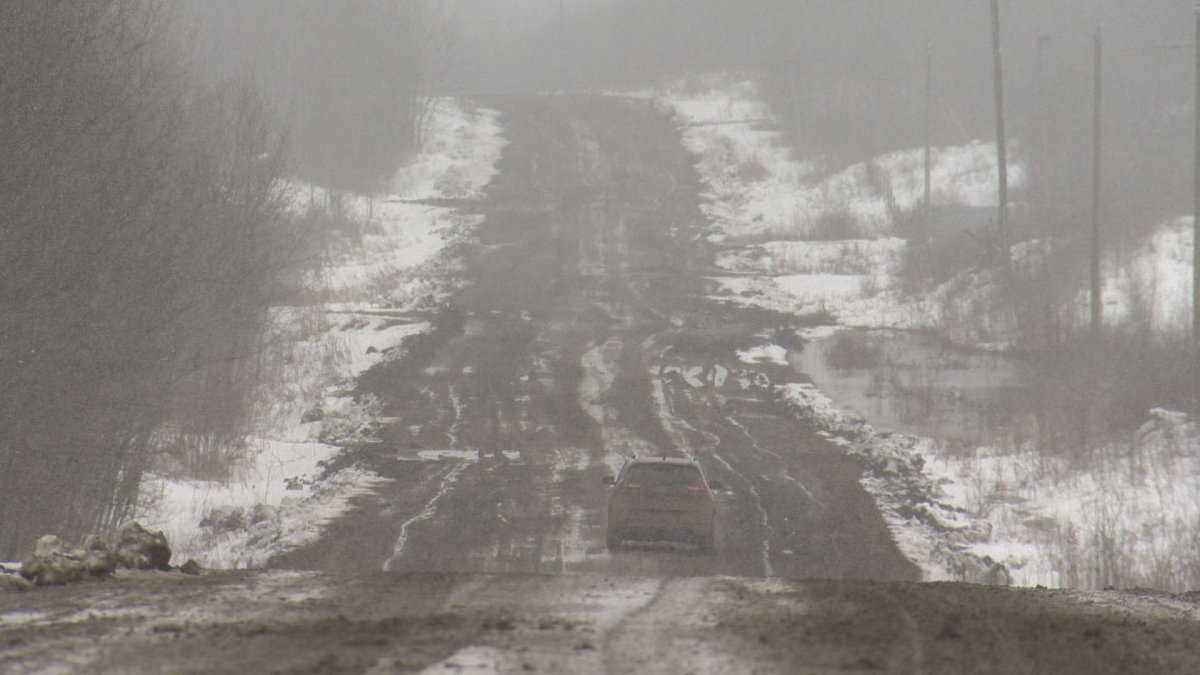Road conditions in an Alberta First Nation reserve two hours northeast of Edmonton have prompted a state of emergency.

Saddle Lake Cree Nation made the announcement Sunday and it is expected to be in effect until later this week. The declaration means there is limited emergency services, home care and nursing as well as bussing.
One impact many residents are feeling very pronouncedly is the limited delivery of water as a result of muddy, slushy conditions.
READ MORE: First Nations enduring decade-old boil water advisories
Kris Moosewah, who has lived in Saddle Lake his whole life, looks after six children in his house. Houses on the reserve are spread out and the majority of people rely on water delivery to their cisterns since they are not connected to the main water system.
“I think the water situation is pretty bad,” he said.
“It affects us because of the kids. We have to limit our water for them to take baths, do our laundry, dishes.”
Moosewah received three jugs of water the day he spoke with Global News, but he admits it likely won’t last long.
Band Councillor Leslie Floyd Steinhauer said there are 110 homes that are on the water system while another 472 are on cisterns.
The community has managed to deliver water in the past, but recent months this past month have “immobilized” its water trucks.
“It was like a perfect mix to make the roads like sponges.”
The state of emergency has, in some ways, crippled the community and brought it to a standstill.
Steinhauer said the weather is the worst he has seen in 50 years.
“Water is an essential part of life. We need that water. If we don’t have water, it hurts our nation,” Steinhauer said.
READ MORE: Many First Nations communities without access to clean drinking water
Fire Chief Robert Cardinal said it feels as though Mother Nature is working against him; his crews have been tasked with not only helping emergency services but also delivering water to those in need, such as the elderly and those with medical issues.
“The ones that are impossible to get to – we’re looking at maybe side-by-sides with the water bottle to run it to the house because you can’t even get a unit down the road,” he said.
Cardinal said the list of those needing water continues to grow. Those who are able can pick them up at the fire hall but there are many who require assistance with delivery.
“We’re hauling at night. We have a crew going around the clock,” he said.
“I don’t see no end. I’d say another week before we even get caught up. If they ration, it’s only going to be a temporary fix. To get caught up, we’ll probably have to go 24/7 just to get caught up.”
Steinhauer is calling on the federal government to assist. He estimates it would take approximately $124 million to upgrade roads and connect all houses on the reserve to the water system.
READ MORE: How an old recessionary plan may be keeping Canada’s First Nations in ‘third world’ conditions
Global News reached out Wednesday to Indigenous Affairs for a comment. On Thursday, a spokesperson for the ministry issued this response:
“The health and safety of all Canadians, including members of Saddle Lake Cree Nation, affected by flooding is a priority for the Government of Canada.
“Indigenous and Northern Affairs Canada (INAC) is in contact with the First Nation and is working with the community and the Alberta Emergency Management Agency to ensure the health and safety of community members.
“Bottled water continues to be provided to community members.
“Investing in infrastructure is about investing in people and communities. It’s about improving the quality of life of Indigenous communities. That’s why Budget 2016 provided as of January 2017, $255 million over two years to First Nation community infrastructure – including roads, bridges and disaster mitigation. The Government of Canada is also providing historic investments of $1.8 billion over five years to support clean drinking water and the treatment of wastewater on reserve, which includes $50.2 million in targeted funding towards 28 water and wastewater projects for Alberta. INAC continues to work in partnership with the First Nation to address their infrastructure and water priorities.”
More details to come.
















Comments